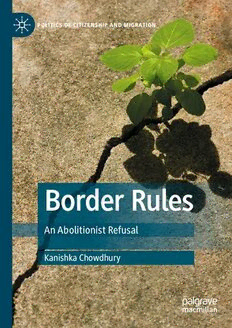
Border Rules: An Abolitionist Refusal PDF
265 Pages·2023·5.083 MB·English
Most books are stored in the elastic cloud where traffic is expensive. For this reason, we have a limit on daily download.
Preview Border Rules: An Abolitionist Refusal
Description:
This book examines both border policies and oppositional narratives of “the border,” 2011–2021, demonstrating that the term designates not merely a line of territorial control but also a set of social relations shaped by persistent, racially differentiated colonial structures and, more recently, by neoliberal modes of accumulation. These relations are shown to determine access to wealth and/or resources and to enable the management of labor, the extraction of surplus, and the accumulation of capital. Discussion in the book is informed by the history of these policies and by the critical literature on borders. Various cultural texts focusing on two border zones―the US–Mexico and the EU–Southern Mediterranean―are analyzed: specifically, two novels, two films, and two murals examined in conjunction with a music video. A path to a borderless future is suggested: an abolitionist refusal of border rules with an insistence on the necessity of abolition.
See more
The list of books you might like
Most books are stored in the elastic cloud where traffic is expensive. For this reason, we have a limit on daily download.
